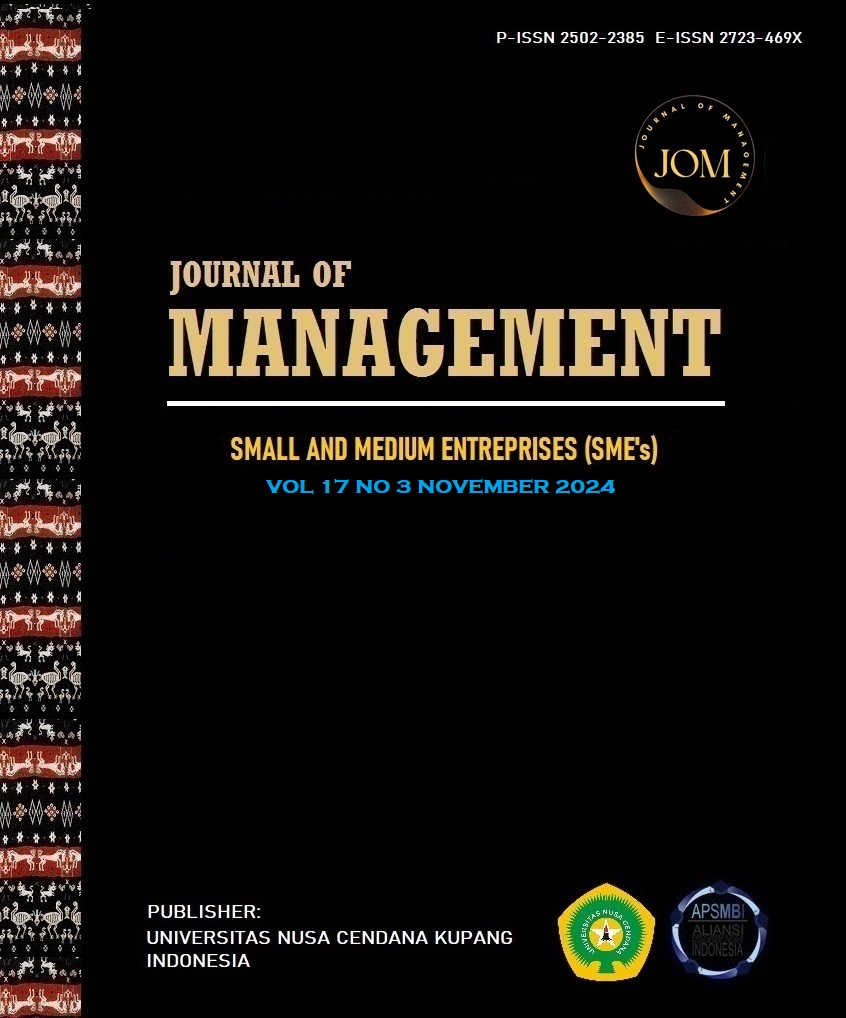PENTINGNYA PENDIDIKAN DAN KETERAMPILAN DALAM MENINGKATKAN ETOS KERJA PEGAWAI DI KANTOR KECAMATAN ULUGAWO KABUPATEN NIAS
Abstract
Until now, an employee's level of education at the Ulugawo District Office in Nias Regency has been ignored and has not fully supported the improvement of employee performance, as there is a lack of employee discretion in carrying out their duties, decision-making authority is still limited, and there is a lack of feedback. The research aimed to examine the importance of education and skills in improving employee ethics at the Ulugawo District Office in Nias Regency. The qualitative research methodology was applied. The study's findings demonstrate that having an education and qualifying abilities might assist enhance the work ethic of employees at the Ulugawo Sub-District Office. Higher education usually provides an improved understanding of employees' tasks and obligations. Qualified skills may also help employees do their tasks more efficiently and successfully.
Keywords: Work Ethic; Education; Skills
Downloads
References
Akhtar, Q., & Nosheen, S. (2022). The impact of fintech and banks M&A on Acquirer’s performance: A strategic win or loss? Borsa Istanbul Review, 22(6), 1195–1208. https://doi.org/10.1016/j.bir.2022.08.007
Alaassar, A., Mention, A. L., & Aas, T. H. (2020). Exploring how social interactions influence regulators and innovators: The case of regulatory sandboxes. Technological Forecasting and Social Change, 160(November 2019).
https://doi.org/10.1016/j.techfore.2020.120257
Arner, D. W., Buckley, R. P., Zetzsche, D. A., & Veidt, R. (2020). Sustainability, FinTech and Financial Inclusion. European Business Organization Law Review, 21(1), 7–35. https://doi.org/10.1007/s40804-020-00183-y
Asif, M., Khan, M. N., Tiwari, S., Wani, S. K., & Alam, F. (2023). The Impact of Fintech and Digital Financial Services on Financial Inclusion in India. Journal of Risk and Financial Management, 16(2). https://doi.org/10.3390/jrfm16020122
Belozyorov, S., Sokolovska, O., & Kim, Y. S. (2020). Fintech as a precondition for transformations on global financial markets. Foresight and STI Governance, 14(2), 23–35. https://doi.org/10.17323/2500-2597.2020.2.23.35
Chang, V., Baudier, P., Zhang, H., Xu, Q., Zhang, J., & Arami, M. (2020). How Blockchain can impact financial services – The overview, challenges and recommendations from expert interviewees. Technological Forecasting and Social Change, 158(June), 120166. https://doi.org/10.1016/j.techfore.2020.120166
Emara, N., & Zhang, Y. (2021). The non-linear impact of digitization on remittances inflow: Evidence from the BRICS. Telecommunications Policy, 45(4), 102112. https://doi.org/10.1016/j.telpol.2021.102112
Gancarczyk, M., Łasak, P., & Gancarczyk, J. (2022). The fintech transformation of banking: Governance dynamics and socio-economic outcomes in spatial contexts. Entrepreneurial Business and Economics Review, 10(3), 143–165.
https://doi.org/10.15678/EBER.2022.100309
Gao, J. (2022). Has COVID-19 hindered small business activities? The role of Fintech. Economic Analysis and Policy, 74, 297–308.
https://doi.org/10.1016/j.eap.2022.02.008
Hamdana, Murwani, F. D., Sudarmiatin, & Hermawan, A. (2022). The effects of financial and technology literacy on the sustainability of Indonesian SMEs: Mediating role of supply chain practice. Uncertain Supply Chain Management, 10(4), 1449–1456. https://doi.org/10.5267/j.uscm.2022.6.011
Hendershott, T., Zhang, X., Leon Zhao, J., & Zheng, Z. (2021). Fintech as a game changer: Overview of research frontiers. Information Systems Research, 32(1), 1–17. https://doi.org/10.1287/isre.2021.0997
Hua, X., & Huang, Y. (2021). Understanding China’s fintech sector: development, impacts and risks. European Journal of Finance, 27(4–5), 321–333.
https://doi.org/10.1080/1351847X.2020.1811131
Kanga, D., Oughton, C., Harris, L., & Murinde, V. (2022). The diffusion of fintech, financial inclusion and income per capita. European Journal of Finance, 28(1), 108–136. https://doi.org/10.1080/1351847X.2021.1945646
Khan, S., & Al-Harby, A. S. A. (2022). the Use of Fintech and Its Impact on Financial Intermediation – a Comparison of Saudi Arabia With Other Gcc Economies. Intellectual Economics, 16(2), 26–43. https://doi.org/10.13165/IE-22-16-2-02
Kim, L. N. T., Doan, T. R. T., & Bui, T. N. (2020). Fintech and banking: Evidence from Vietnam. Journal of Asian Finance, Economics and Business, 7(9), 419–426. https://doi.org/10.13106/JAFEB.2020.VOL7.NO9.419
Msomi, T. S., & Nzama, S. (2022). Financial literacy and SME loan repayments in South Africa during the COVID-19 era. Investment Management and Financial Innovations, 19(4), 113–121. https://doi.org/10.21511/imfi.19(4).2022.09
Muganyi, T., Yan, L., Yin, Y., Sun, H., Gong, X., & Taghizadeh-Hesary, F. (2022). Fintech, regtech, and financial development: evidence from China. Financial Innovation, 8(1). https://doi.org/10.1186/s40854-021-00313-6
Najib, M., Ermawati, W. J., Fahma, F., Endri, E., & Suhartanto, D. (2021). Fintech in the small food business and its relation with open innovation. Journal of Open Innovation: Technology, Market, and Complexity, 7(1).
https://doi.org/10.3390/joitmc7010088
Ningrat, R. G., & Nurzaman, M. S. (2019). Developing Fintech and Islamic Finance Products in Agricultural Value Chain. Journal of Islamic Monetary Economics and Finance, 5(3), 491–516. https://doi.org/10.21098/jimf.v5i3.1077
Owusu, J., Ismail, M. Bin, Osman, M. H. B. M., & Kuan, G. (2019). Financial literacy as a moderator linking financial resource availability and SME growth in Ghana. Investment Management and Financial Innovations, 16(1), 154–166. https://doi.org/10.21511/imfi.16(1).2019.12
Putri, W. H., Nurwiyanta, N., Sungkono, S., & Wahyuningsih, T. (2019). The emerging fintech and financial slack on corporate financial performance. Investment Management and Financial Innovations, 16(2), 348–354.
https://doi.org/10.21511/imfi.16(2).2019.29
Stankevičienė, J., & Kabulova, J. (2022). Financial technology impact on stability of financial institutions. Technological and Economic Development of Economy, 28(4), 1089–1114. https://doi.org/10.3846/tede.2022.17093
Thomas, N. M. (2023). Modeling key enablers influencing FinTechs offering SME credit services: A multi-stakeholder perspective. Electronic Markets, 33(1). https://doi.org/10.1007/s12525-023-00627-6

 Saforius Gori(1*)
Saforius Gori(1*)



